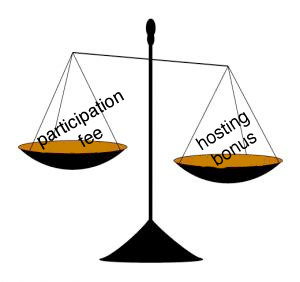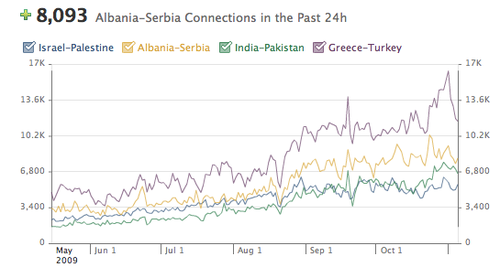Are 9 pounds per day per participant enough or too much?During our national board meeting in Germany we recently discussed the new international fee structure for our programmes. At the AIM, a standard fee of 9 GBP per day per participant was introduced for the Village, Summer Camp, Seminar Camp and Youth Meeting programme. 3 out of the 9 GBP are used for international administration. The other 6 GBP are transferred to the hosting chapter as a "hosting bonus".

I was wondering: why did we chose these 6 pounds? Obviously we have to strike a balance between participation fees that are to high so that nobody can afford to take part in our programmes. On the other side the "hosting bonus" must be high enough to help and motivate chapters. I guess that the 6 pounds were chosen as a compromise between existing hosting fees.
The other question is, why 3 GBP for administration? This number easier to explain, because it simply has to cover our international expenses: IO rent and salaries as well as the costs of our international committees (which have been fairly stable during the last years) have to be covered by the 3 pounds per participant. It's nice that the amount we spend on administration is so transparent now, but also shocking to see that we are spending 33% of our participation fees on international administration! Funds spent on national or chapter level isn't even part of the discussion.
So what to make out of all this?
- My feeling is that 33% of participation fee for administration are quite high. Hence, a major goal should be to reduce the percentage of international administration. The best solution would be to increase the number of programmes we host. Assuming that international administration remains the same, no matter how many programmes we have (which is only partly true), we could easily reduce the 3 GBP administration fee. (See also my post about
quality and quantity.) The other alternative, of course, is cutting costs by firing IO personel and killing costly comittees. (Why this may not be as bad as is sounds is covered in the
starfish vs. spider post)
- We need some kind of a monitor system to measure, whether the 6 GBP host fee are right: Are we lacking hosts (because chapters can't pay to host) or are we lacking participants (because participants can't afford the fees)? Somebody should be keeping track!
A few more thoughts on the fee structure in general:
- Mosaic is excluded, of course. But IPPs and Interchange should be included: Not for the host fee, but for the administration fee: Every participant should pay the exact same 3 GBP per day per participant.
- Seminar camps are also a bit odd: From the 6 GBP host fee only 3 go to the hosting chapter: Comparing Summer Camps and Seminar Camps from the chapters perspective, you only get half the hosting bonus for the latter.
- Personally, whereas I like the ideas of transparency and alignment o the participation fees, I would still favor getting rid of the host fee altogether: Check out my reasoning on the
original motion.


